Politics tired
After the start of the full-scale invasion, the political agenda on television, which had been abundant before, became dominant, and for some time the demand for it was really high. In 2022, a surge of Russian interest in news and socio-political programs was recorded twice: immediately after the start of the invasion, that is, in February-March, and after Putin announced “partial mobilization,” that is, at the end of September and October. According to research firm Mediascope, news views increased by 50% and political shows by 88%. But these relative growth figures can sound misleading. So, for example, the share of the Sunday program "Vremya" on Channel One in 2014 was 23%, in 2015 – 16%, and in 2022 – 9.3%. The Sunday “Vesti Nedeli”, which rushed up in 2022 on the Rossiya channel, reached 18%, but this is only slightly different from the figures for 2014-2015 (note that the share is considered relative to the audience of other programs, but if we consider the entire population of Russia, then the most rated releases are watched by 4-5% of the country's population).
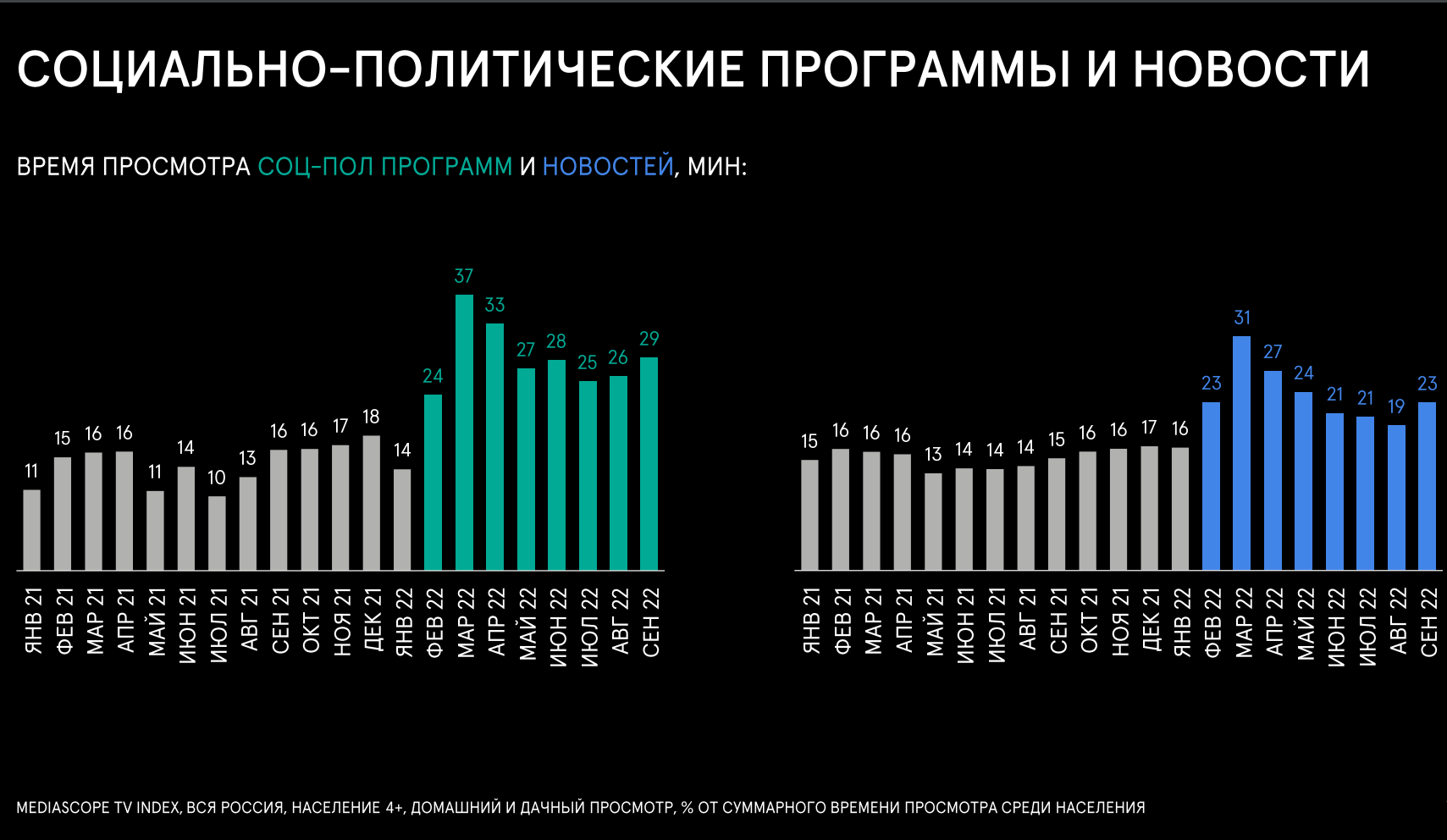
Viewings of entertainment programs and series over the past year have fallen by 22% and 15%, respectively, compared to last year, which is primarily due to the fact that after the start of the war, part of the entertainment content was simplyremoved from the air of federal channels. For example, in the program schedule of Channel One, there are no more programs “Let's Get Married” and “Field of Miracles”. According to Mediascope, cinema and entertainment programs on Channel One on weekdays before the start of the war accounted for approximately 50-60% of the airtime, in March this figure fell to almost 10%.
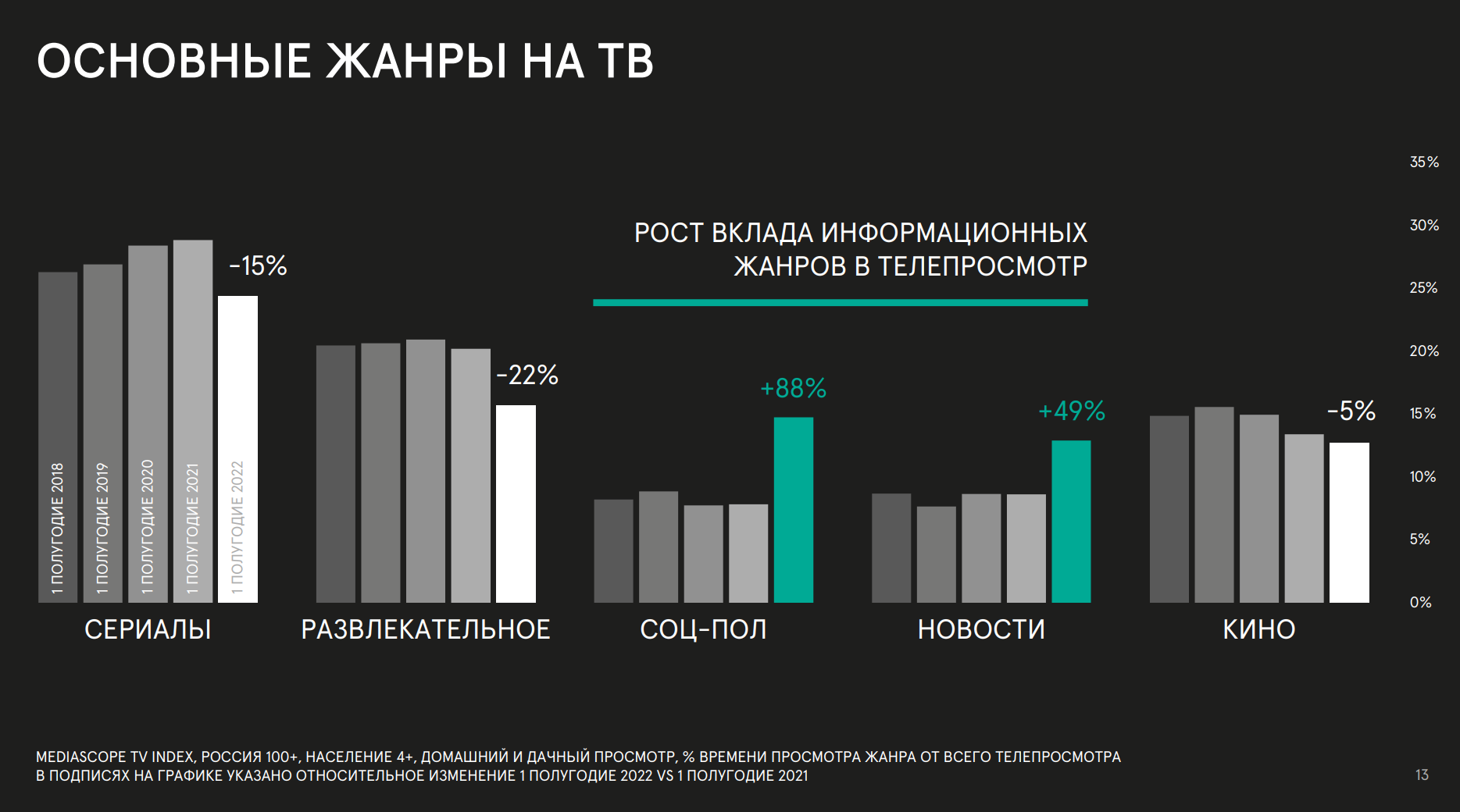
Political talk shows over the past year have become especially aggressive and have changed the nature of their guests: more and more often, all sorts of psychics, fortunetellers and astrologers have become the “experts” of such programs.
supernatural popularity
In the second half of January, 16 of the 80 Malakhov talk shows that had aired so far were included in the rating of the 100 most popular programs among Russians over four years old. At the same time, 11 of them were devoted to supernatural topics. “Predictions of an Afghan mathematician”, “Chechen seer”, “Military psychics on the front line”, “People X among us” – judging by the names of the broadcasts, now the Russia 1 channel entertains viewers with the help of clairvoyance.
The main guests of the show, indeed, were tarologists, numerologists, astrologers and psychics. The topic has also changed: if earlier the broadcasts were devoted to the stories of stars and ordinary people who got into difficult situations or found themselves in the center of a scandal, now the program participants discuss military and socio-political topics, make predictions about the outcome of the war with Ukraine, the future of Russia and Vladimir Putin .
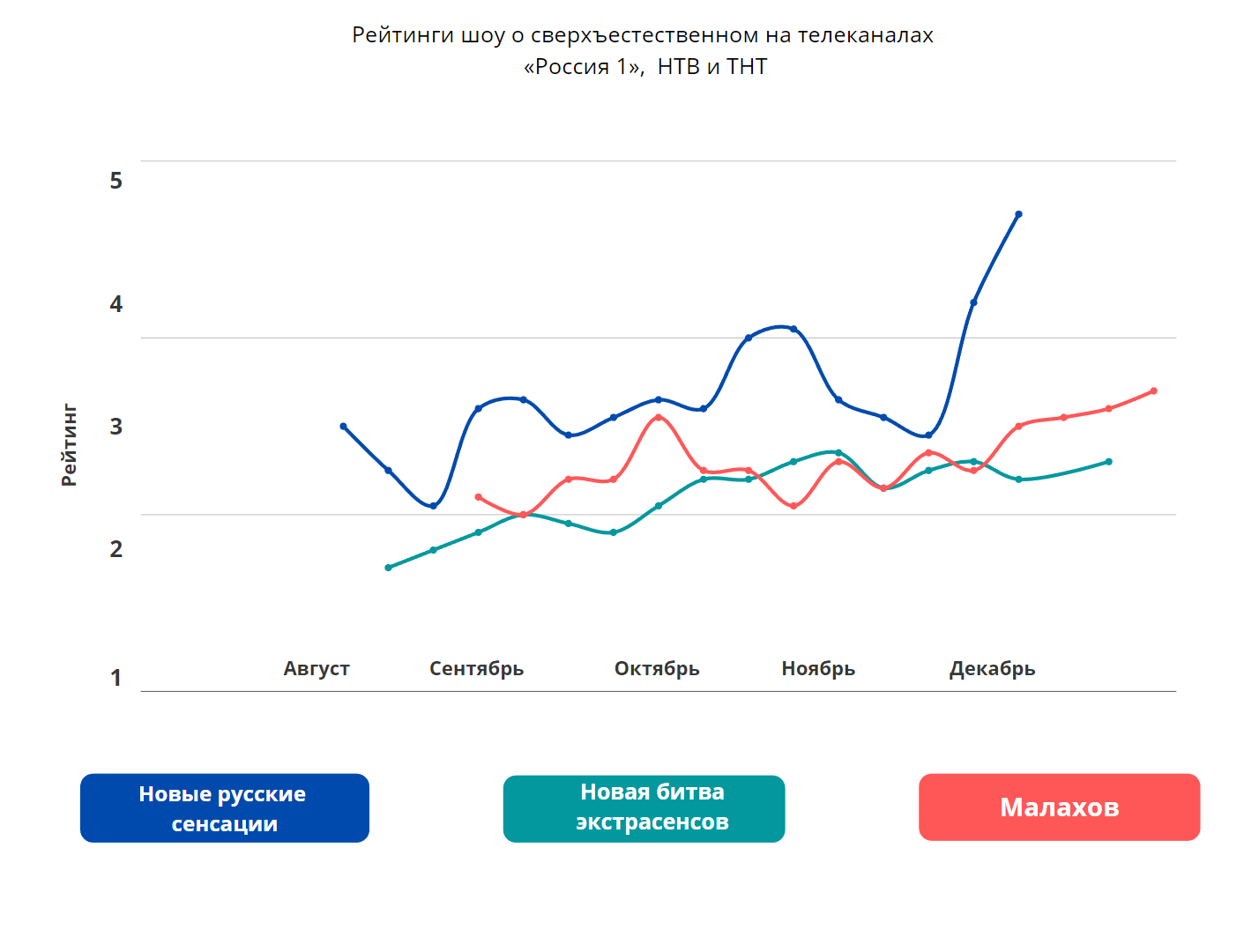
Another "supernatural-political show" called "New Russian Sensations" strengthens the ratings on NTV. The January 22 issue of "Messenger Vanga" received a rating of 5.3 – a record for the program this season, and ranked third in the list of the 100 most popular programs among Russians for the week. In total, 16 episodes of the program made it into the top 100. Six of them are dedicated to throwing mud at the President of Ukraine: "Recapture the husband from Zelensky", "Stars against Zelensky", "Zelensky's goddess of death", "Zelensky's terrorist clan".
The rating also increased for the program “New Battle of Psychics” on TNT. The show regularly enters the top 100 most popular programs among Russians of all ages, but if in September it was at the bottom of the list, then by mid-December it had risen to the top twenty.
“Russia will be great”: what do Z-oracles say
Predictions and prophecies on television are made strictly in accordance with the ideological line of power. So, on the air of the Malakhov talk show on December 12, a military psychic, Lieutenant General Alexei Savin, who allegedly worked in Soviet intelligence, said that the Russian president surpasses all other rulers:
“We were glad how much our leader Vladimir Vladimirovich is stronger intellectually, spiritually stronger [the leaders of Europe and the USA]. God has given us such a leader.”
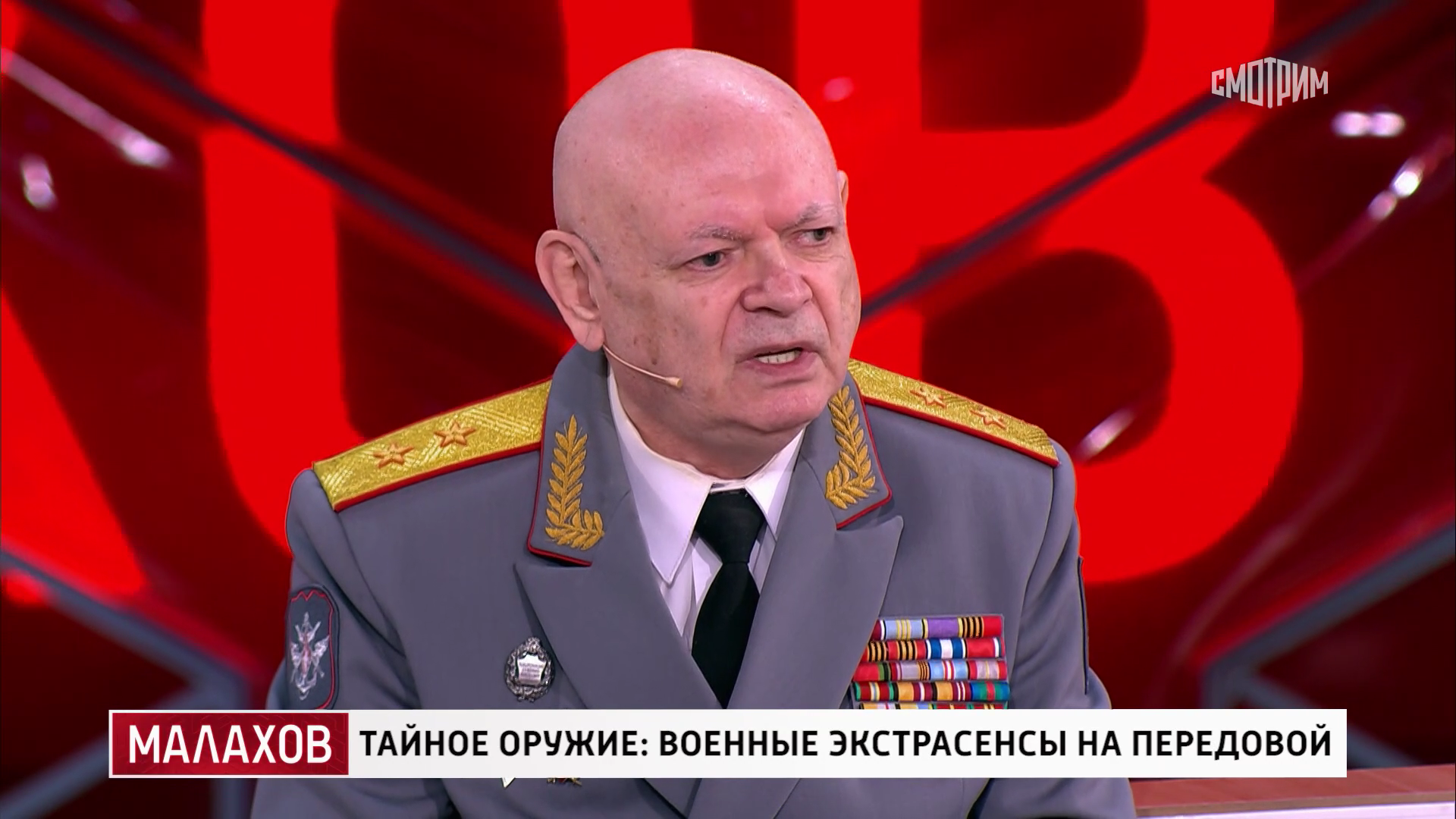
On the air of January 25, 2022, fortune teller Tamara Globa predicts that after difficult years, Russia will succeed:
“No matter how other countries try to crush Russia now, this is good for us. Because, thanks to this, we “wake up”. The character of a person living in Russia is a form of protest: to act not thanks to, but in spite of. There was a desire to build their own payment systems, and their social networks, and new directions in trade and agriculture. And no matter how someone pushes us away now, many people will eventually rush to us: both with business and with the idea of living in Russia.”
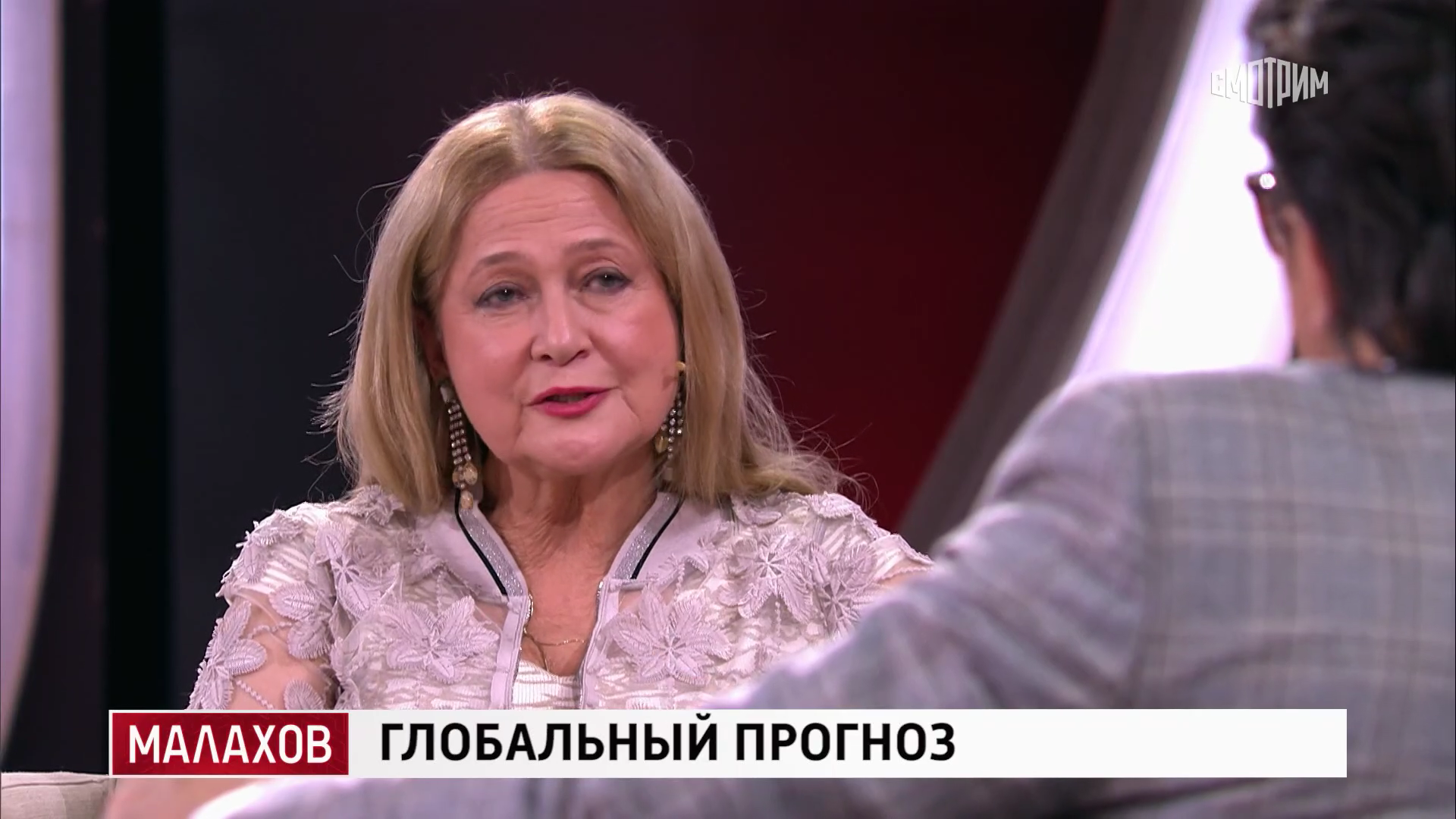
Another guest of the same show is a hereditary soothsayer from Chechnya – Aizen, "whose appearance was predicted by Nostradamus himself." The visionary is close to the ideology of the superiority of the Russian people: "Russia is the messiah, she and the whole people are the savior of mankind." In his prediction, he calls on the Russians to “rally” against the enemy, whom, in the spirit of the supporters of the “Russian World”, he identifies with Satan:
“The bastard will come from where you do not expect. To prevent this from happening, we all need to rally together against satanic evil. We, the Russian multinational people, are destined to save humanity, let's rally around the leadership, we need to mobilize our pure intentions, spiritual impulses against imperialist evil.
Psychics were also invited to NTV in the show "New Russian Sensations". Ivan Fomin, 86, who is described as a "combat psychic from the KGB", predicted the surrender of Vladimir Zelensky in the fall of 2022 and his succession as president in 2023. The first prophecy is no longer destined to come true, but it is unlikely that Fomin will continue to be invited to television.

According to the Afghan prophet-mathematician Sediq Afghan, the leader of Ukraine will not go anywhere: “The figures clearly indicate that next year Zelensky will continue the tactics of nuclear blackmail of humanity.” The words of the predictor are accompanied by a video sequence with Vladimir Zelensky nodding in the affirmative, as if agreeing, a technique designed to increase the viewer's level of confidence. Other statements by the prophet echo those of political propaganda show experts: “America will run out. There will be no America as a great power”, “the EU will fall apart, it will happen from 2027 to 2032”, “it will not come to a nuclear world war in the near future”.
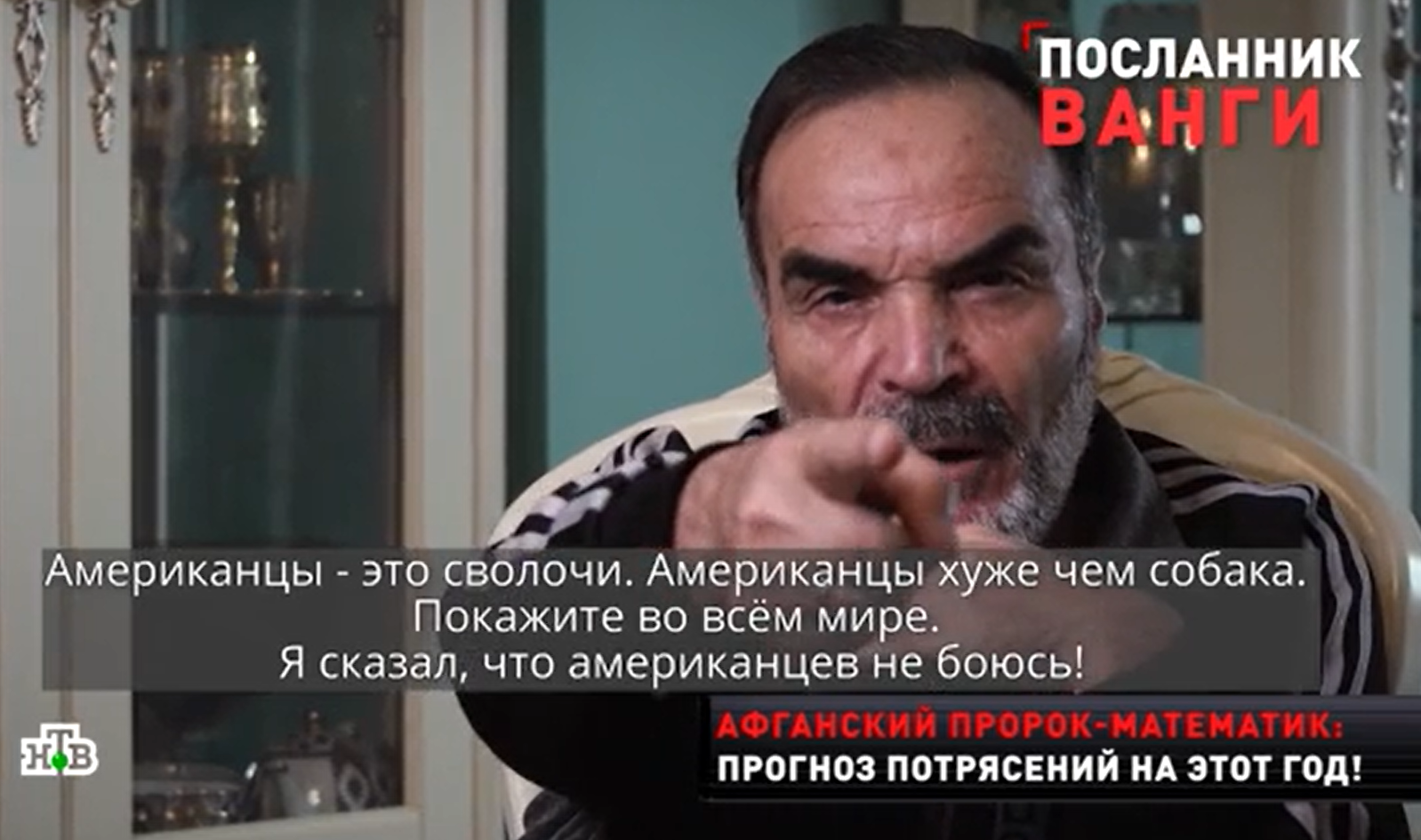
The next birth on Russian TV is experienced by the statements of famous soothsayers of the past: Nostradamus, Vanga, Messing and others. Their predictions are allegorical and vague, and therefore are easily substituted for a new special operation narrative. “The power that declares itself against Russia will lose the war and perish,” quotes the prophecy of the Bulgarian seer NTV. And also publishes the prophecy of the elder Zosima, who died more than 20 years ago in the Donetsk region, who allegedly predicted all events in Ukraine long before the Russian invasion. The host of the program “Actually” (Channel One) did not stop at the already known forecasts and announced that in May 2022 a lost videotape with Vanga’s predictions about events in Ukraine was found:
“The prophecy of five deuces is coming true, because on February 22, 22, Russia recognized the independence of the LNR and the DNR, and for two days it was forced to start a military special operation in Ukraine.”
Superstition as a sign of a turning point
The rise in popularity of esoteric shows reflects a general increase in interest in superstition, divination and prophecy at a difficult time for the country and society, political psychologists say. The situation is aggravated when there is an ideological disorientation in society, the people do not fully understand the ideas proposed by the authorities and the vector of movement. This is an attempt to understand what is happening through the irrational, since the logical explanation does not work or does not suit you in some way. This is a fairly clear trend that can be traced in different states in different historical periods.
Thus, in the United States and Europe, the golden age of spiritualism came after the First World War and the flu pandemic, which destroyed tens of millions of people. The fascination with divination and divination captured the American political elites and threatened American national security, argued the illusionist, philanthropist and quack fighter Harry Houdini. In 1926, with his filing in Congress, a draft law was obeyed for four days in a row, prohibiting divination and predictions in the District of Columbia.
A wave of superstition swept over Germany towards the end of World War II, and after it ended, belief in the supernatural blossomed with even greater force. Monica Black, an American historian and editor of Central European History, talks about this in detail in her book “The Earth Possessed by Demons. Witches, healers and ghosts of the past in post-war Germany. People began to listen to any hypotheses, sort out many options for the outcome of the war, and almost everyone at that time was engaged in predicting the future, the writer notes:
“After 1943, when the war assumed a deadly character within Germany itself, all kinds of chimeras were irresistibly attractive. Forebodings, gossip, and legends have acquired tremendous predictive power, Black writes. –. Rumors, conjectures and rumors have reached epistemological weight. People read the signs to understand what was incomprehensible to them, even unthinkable: that they were losing the war.”
German society found itself sandwiched between the old Hitlerite ideology and the new ideology, which proclaimed the old world evil. The collapse of everything that people had been accustomed to for many years, and the lack of new landmarks, literally led to an obsession with the supernatural, Black said. Moreover, the degree of withdrawal into superstition was so deep that it was not only about idle fortune-telling and predictions, as it is now in Russia. Cases of “witch hunts” also began – citizens were visited by paranoid thoughts about certain sorcerers and witches who could harm, curse and send a disease. This was expressed in the mass denunciation of citizens against each other. Formally, these were accusations of malice, of various misdeeds, but behind them was an irrational medieval fear of witches.
Formally, the denunciations were about misconduct, but behind them was an irrational medieval fear of witches
Monica Black suggests that the fear of witches was the result of a constant subconscious expectation of retribution for the atrocities of the Reich leadership – after the Germans realized the extent of the evil that Hitler, with their approval, inflicted on other nations. In other words, a manifestation of the very “collective guilt” that is still being discussed against the backdrop of the war with Ukraine.
At the same time, the leadership of the Third Reich also tried to use the irrational fear of the population for their own purposes:
“Hoping to cheer up the nation, Goebbels promised miracles, including a “wonder weapon” that would change the course of the war. He instructed his staff to print and anonymously mail out prophecies predicting Germany's ultimate triumph. Old legends and bits of folklore circulated depicting the radiant, greatest German Reich, symbolized by a huge bird sheltering chicks, a surreal image of humanity in the midst of a war of annihilation.
Russia, too, experienced something similar in the late 1980s and 1990s, recalls political psychologist and media expert Nikolai Grigoriev:
“For the first time since Kashpirovsky and Chumak, psychics, the occult and the paranormal, are back in fashion. It is worth noting here: the passion for the non-rational frontier of the 80-90s accompanied the expansion of the field of media and show business opportunities. Now the conditions are reversed: the possibilities of both media and show business are narrowing.”
Who are psychics fooling
However, it will become more difficult for propagandists to influence the audience through television: the average time spent watching TV is consistently decreasing in all age groups. In 2022, Mediascope recorded its lowest rate in six years.
However, it is premature to talk about a complete rejection of television: 88% of the population still watches TV every week, and 63% every day, which is about 90 million people. Moreover, the average viewing time among older audiences over 65 in 2022 was more than 6.5 hours per day, according to a Mediascope report.
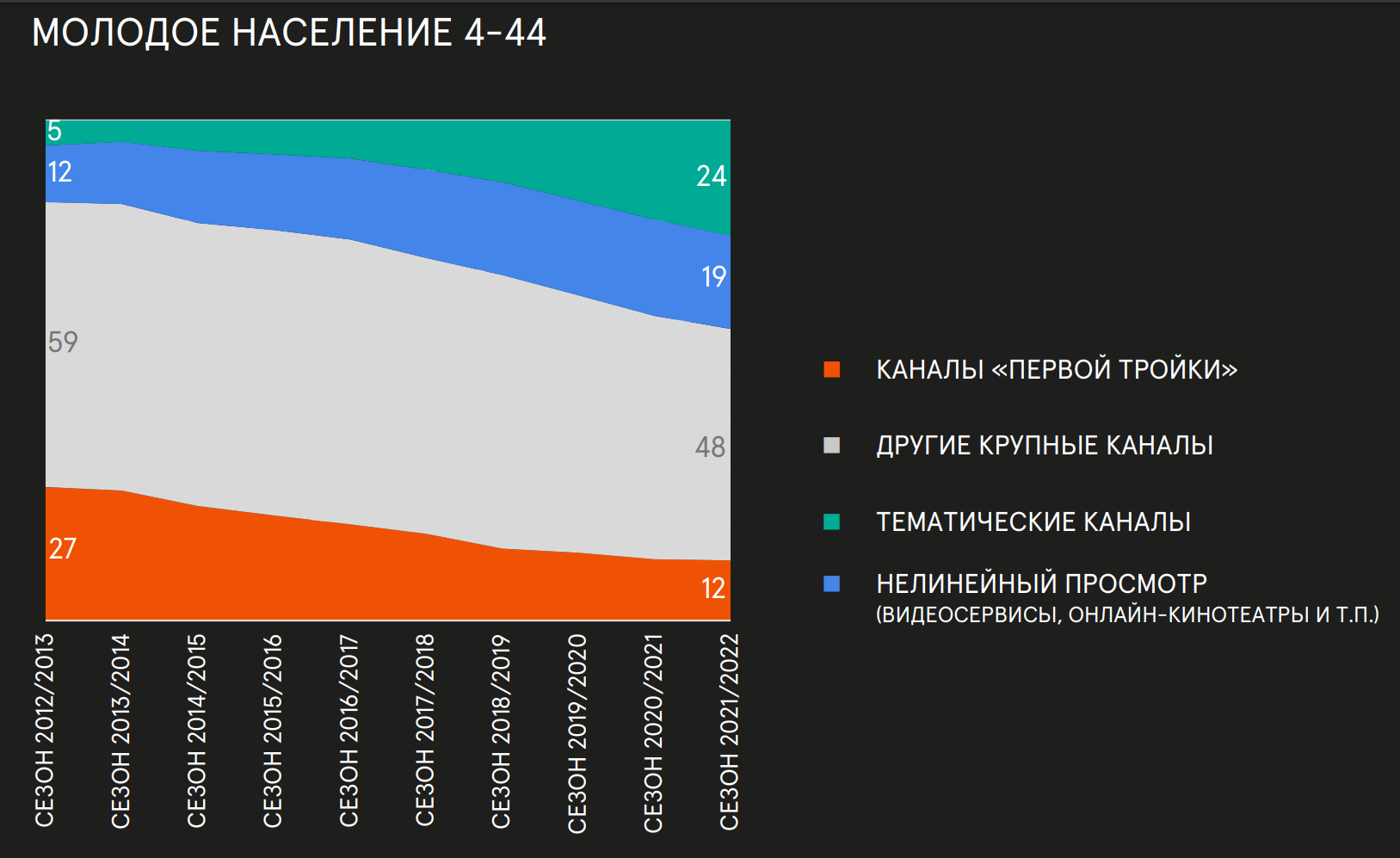
The ratings of the “big three” are also falling, mainly among a young audience (from 4 to 44 years old), who prefer thematic channels to federal ones, despite the unprecedented number of “historical events” over the past few years, when there is a clear request for news and analytics.
At the same time, the 65+ audience remains a devoted consumer of propaganda: in this group, the Troika channels not only did not leave the top 3, but also increased their indicators, although only slightly, compared to 2020-2021. Accordingly, the demonstration of "patriotic psychics" through federal channels will most likely only affect the age audience.


